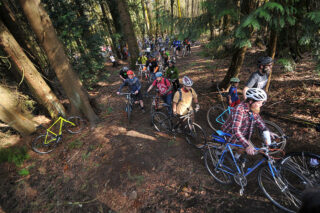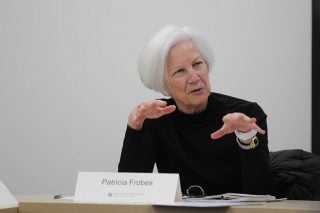
(Photo: J. Maus/BikePortland)
Portland’s Off-road Cycling Master Plan got a shot in the arm today from an influential city advisory committee.
The Portland Parks Board expressed strong support for the plan in a letter to Bureau of Planning and Sustainability Project Manager Tom Armstrong. The letter clears the way for Portland City Council to approve the plan — and to push back against those who are using false narratives to oppose it. The Parks Board has dismissed two of the main talking points of people trying to stop the plan: That that off-road cycling is incompatible with nature and that it can’t be done safely in an urban environment.
The letter (PDF), dated April 11th, comes after the Board received hundreds of public comments and hosted a special meeting on the plan earlier this month.
Signed by Parks Board Chair Patricia Frobes, the letter outlined a few relatively minor concerns and said the Board is “generally supportive” of the plan because it is, “a good conceptual road map for a city-wide system of off-road cycling.” And that system, Frobes wrote, should include even more places to ride. “Although the ORCMP proposes a good locational mix of bicycle parks,” she wrote, “it proposes no new urban off-road cycling trails on the west side. Further, the ORCMP does not adequately identify opportunities to connect parks to parks, parks to schools and parks to trails.”

(Photo: J. Maus/BikePortland)
The letter expresses concerns that because the plan limits its scope to city-owned properties it, “risks creating isolated, unconnected cycling facilities.”
More good news for bike advocates is that the Parks Board clearly states that the Off-road Plan is consistent with 2020 Vision for Portland Parks, Portland Parks & Recreation’s Strategic Plan, 5-Year Equity Plan, the Renew Forest Park Initiative — and most importantly — the Forest Park Natural Resources Management Plan (FPNRMP). This is key because it will give Mayor Ted Wheeler and his colleagues on city council confidence to support the plan when it comes to City Hall for adoption.
People who oppose off-road cycling have held up the FPNRMP as a bulwark against bikes. “That document,” wrote Forest Park advocate Marcy Houle in an op-ed against the plan published by the Portland Tribune this week, “is the only thing protecting the wildlife of Forest Park.”
And in another nod to concerns about the safety of cycling on trails that are likely to come up at city council, the Parks Board says they are, “particularly supportive of the fact that the Plan relies on best management practices and state of the art national standards for trail design and natural resource protection. The best management practices proposed in the ORCMP should be immediately adopted to minimize impacts and optimize safety.”

(Photo: J. Maus/BikePortland)
To accomplish all this, the letter says “a variety of partnership programs” will be critical to success of the plan. This will be music to the ears of advocates at NW Trail Alliance who have all but begged Portland Parks to work with them. At the Parks Board meeting they held signs that read: “Let NWTA Help”.
What did the Parks Board have to say about the old canard that bikes on trails are bad the environment? The letter says the Board has concerns that, “Some potential sites were eliminated… based on an untested assumption that trails would compromise environmental goals.”
The letter also addressed concerns about equity that were brought up at the April 3rd meeting: “The Plan is the product of a technically well-supported planning process with substantial community involvement and outreach to underserved communities.” (Parks Director Mike Abbaté followed-up with the Board after the meeting to explain the focus on equity during the extensive public outreach process.)
Advertisement
One of their main concerns is in some ways a positive one for off-road cycling advocates: The Board worries that the plan lacks a clear funding and implementation plan. Even though the Board itself says building off-road bike trails isn’t a high priority of theirs “given current budget constraints and competing priorities,” the letter states:
“The Plan does not adequately identify implementation funding sources or priorities or specific outcomes against which progress can be measured. The Board respectfully recommends that the ORCMP Advisory Committee be enlisted to develop implementation priorities and measurable outcomes.. the Plan should require the identification of a reliable funding source for trail maintenance before new trails are constructed.”
Forest Park and River View

These are the two elephants in the room of off-road cycling in Portland. The Parks Board addressed both in their letter.

(Photo: City of Portland)
Frobes wrote that the Board believes the plan, “appropriately balances policy direction for cycling trails in Forest Park with the goals of resource protection and conservation.”
As for what to build in Forest Park, the Board supports both of the plan’s “high priority” concepts: improve Firelane 4 and open it up to cycling, and improve Firelane 1 and build a new bike trail parallel to Highway 30.
Specifically, Concept C would rebuild Firelane 4 (which is really more of an overgrown trail now) and make it a “contouring trail that follows modern trail building best practices.” The plan says the new trail, “could be designed as a purpose-built off-road cycling trail or as a shared-use trail.” When completed, this new trail would create a three-mile loop with NW Saltzman Road and Leif Erikson Drive. Concept D would make the 2.5 mile Firelane 1 more ridable and build a new trail to connect it to the new Nature Center being built on Highway 30.
With River View Natural Area (RVNA), the Board was finally able to flex their muscles. Back in 2015 the Board demanded answers from Commissioners Nick Fish and Amanda Fritz after the two abruptly ended a public process and unilaterally decided to prohibit cycling in the park.
In their letter, the Board offers support for a shared-use perimeter trail at River View, “as a reasoned and incremental approach to off-road cycling in RVNA.” Going further on an issue that has sparked major controversy due to the unsubstantiated allegation that cycling will have a negative impact on RVNA, the letter states, “The Board believes the recommendation is based on best practices for trail design and management to avoid, minimize or mitigate adverse environmental impacts and restore the ecological health of the site.”
CORRECTION, 4/14: This post originally identified Tom Armstrong as the director of the Bureau of Planning and Sustainability. That was wrong. He’s a project manager. Susan Anderson is BPS director. We regret the error.
— Jonathan Maus: (503) 706-8804, @jonathan_maus on Twitter and jonathan@bikeportland.org
Never miss a story. Sign-up for the daily BP Headlines email.
BikePortland needs your support.

